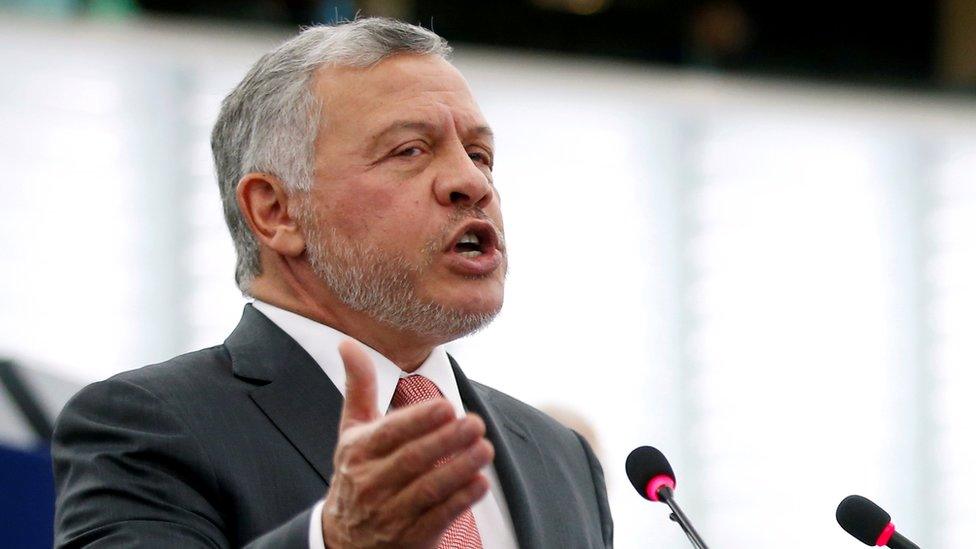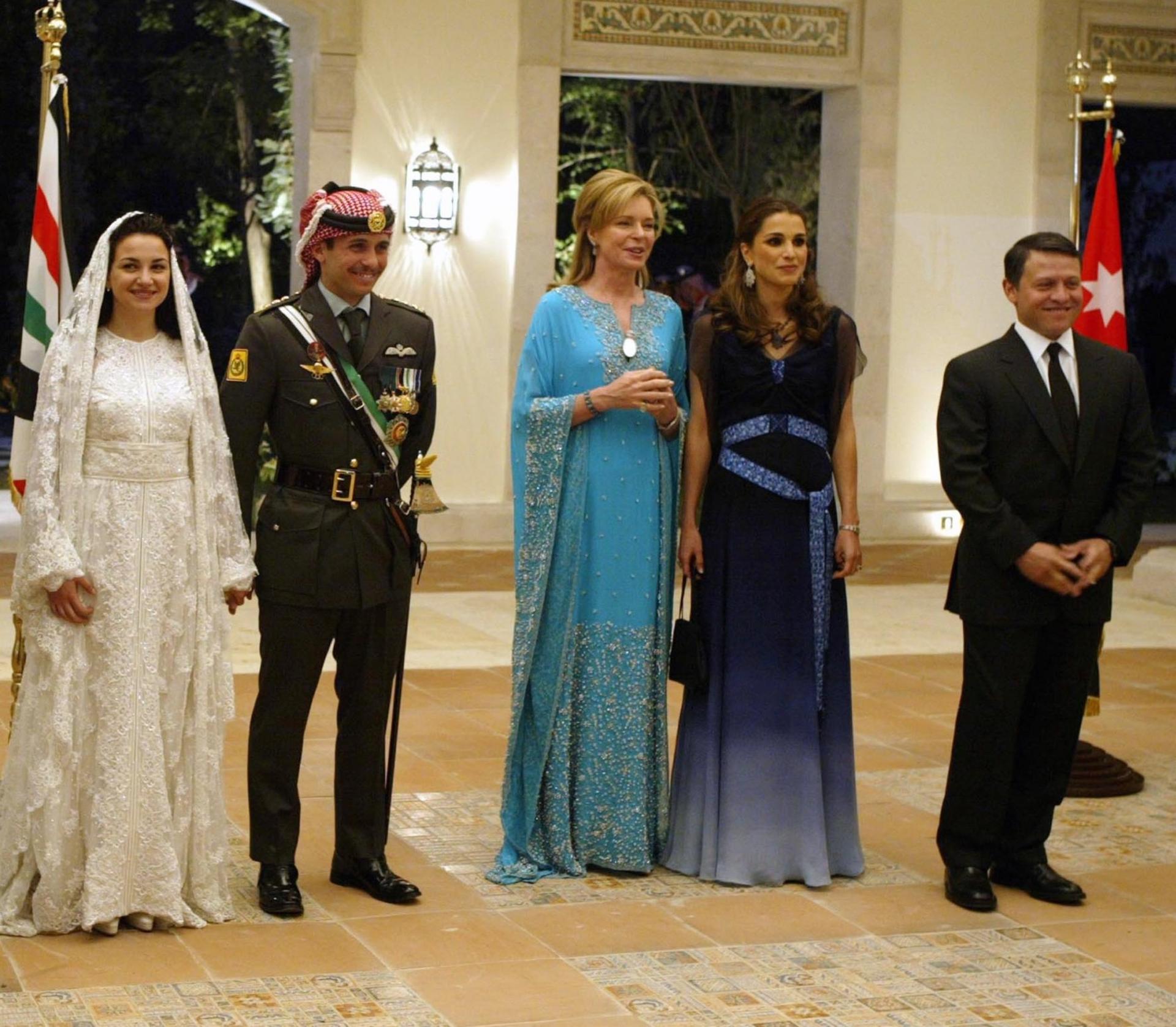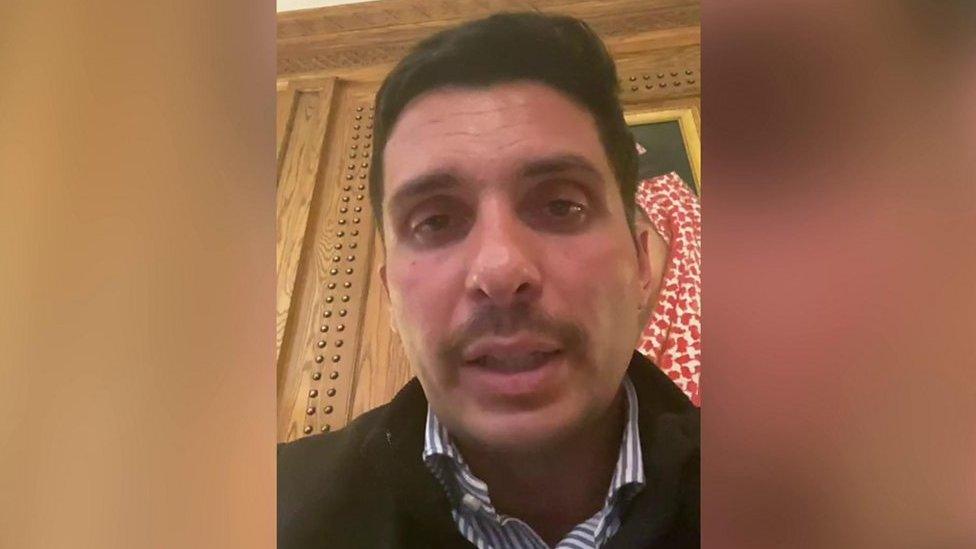Jordan's King Abdullah describes 'most painful' royal rift
- Published

King Abdullah said the crisis facing the kingdom had been "nipped in the bud" (file photo)
Jordan's King Abdullah has expressed "shock, pain and anger" over an alleged plot to destabilise the kingdom.
"The challenge of these last days was not the most dangerous for the stability of the country - but it was the most painful for me," he said in comments read out on state TV.
King Abdullah was responding to an alleged conspiracy against the state, said to involve his half-brother, Prince Hamzah bin Hussein.
It was his first comment on the matter.
It follows claims by Prince Hamzah that he had been put under de facto house arrest by the government.
In Wednesday's broadcast, King Abdullah's comments sought to reassure Jordanians that the crisis was now over.
"Parties behind the sedition came from within our house and outside it," his address said, adding: "The sedition has been nipped in the bud."
King Abdullah's speech - which was read out by a TV presenter - said that Prince Hamzah had "pledged to remain loyal" and "put Jordan's interest, constitution and laws above all other considerations".
"Hamzah is now with his family in his palace under my care," the king's speech said, adding that an investigation into the alleged plot was continuing.


On Tuesday, Jordan's government issued a ban on reporting about the alleged plot ,which extended to social media networks.
In a statement to the state-run Petra news agency on Wednesday, Prosecutor General Hassan al-Abdallat said the media ban affected only "matters related to the investigation".
"The gag order excludes matters related to freedom of speech and expression in accordance with the law," the statement added.
What's the royal rift about?
Last Saturday Prince Hamzah, 41, released two videos to the BBC in which he said he had been placed under house arrest.
He said a senior official had told him he was not allowed to go out or communicate with people because of criticisms of the government or king voiced at meetings where he had been present.
The apparent house arrest is thought to have followed a visit by the prince to tribal leaders, where he is said to have garnered some support to destabilise the kingdom.
On Sunday, Deputy Prime Minister Ayman Safadi said the prince had been liaising with "some foreign entities" and had been monitored for some time.
He accused the prince of seeking to mobilise "clan leaders against the government". Mr Safadi said officials had tried to discourage the prince rather than take legal action, but Prince Hamzah had "dealt with this request negatively".
He added that at least 16 people, including a former adviser to King Abdullah and another member of the royal family, had been arrested over the plot. But no members of the armed forces were said to be among those detained.
Also on Sunday, Jordan's opposition released a recording in which a defiant Prince Hamzah said he would not obey orders from the authorities.
Prince Hamzah bin Hussein said his internet and phone lines had been cut
Then, in an apparent easing of tensions on Monday, the prince signed a letter confirming his loyalty to King Abdullah.
In the letter, released by the palace, Prince Hamza is quoted as saying: "I place myself in the hands of his majesty the king... I will remain committed to the constitution of the dear Hashemite Kingdom of Jordan."
The prince has not spoken publicly since sending videos to the BBC at the weekend.
The public rift between Prince Hamzah and King Abdullah is unprecedented. Tensions within the royal household, however, have reportedly been present for some time.
Meanwhile, neighbour and regional power Saudi Arabia has reaffirmed its support for Jordan's government.
Who is Prince Hamzah?
The oldest son of the late King Hussein and his favourite wife Queen Noor, Prince Hamzah is a graduate of the UK's Harrow School and the Royal Military Academy at Sandhurst. He also attended Harvard University in the US and has served in the Jordanian armed forces.
He was named crown prince of Jordan in 1999 and was a favourite of King Hussein, who often described him in public as the "delight of my eye". However, he was seen as too young and inexperienced to be named successor at the time of King Hussein's death in 1999.

King Abdullah and his wife Queen Rania (pictured far right) attend the wedding ceremony of Prince Hamzah and his first wife Princess Noor (left) alongside Hamzah's mother Queen Noor (centre) in 2004

Instead his older half-brother, Abdullah, ascended the throne and stripped Hamzah of the title of crown prince in 2004, giving it to his own son. The move was seen as a blow to Queen Noor, who had hoped to see her eldest son become king.
Related topics
- Published6 April 2021

- Published5 April 2021
